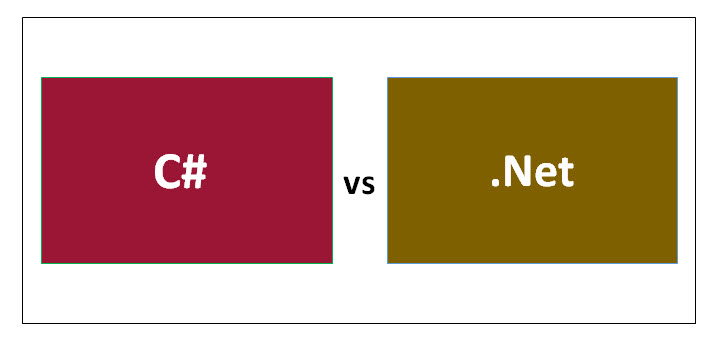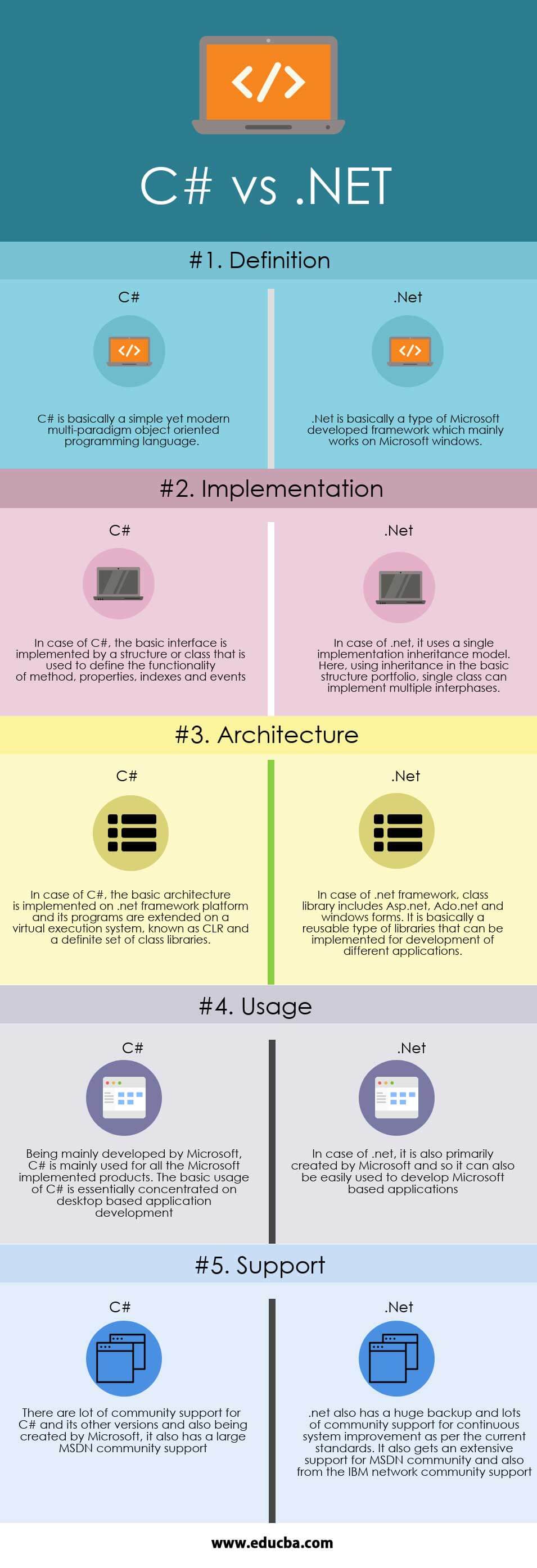Difference Between C# and .Net
C# vs .Net are two of the important language and framework artifacts in the Software Development Industry. C# is basically a simple yet modern multi-paradigm object-oriented programming language. Microsoft initially developed it within its own.Net framework initiative. .Net is basically a type of Microsoft developed framework that mainly works on Microsoft Windows. It is basically a reusable type of libraries that can be implemented for the development of different applications.
C#
C# is mainly designed for Common Language Infrastructure (CLI). It was initially developed by Anders Hejlsberg and was approved by European Computer Manufacturers Association and International Standard Organization. Please find below a few crucial characteristics of C# language:
- Standard Library presence
- Easy to Learn and use procedures
- Easy multithreading
- Provision of conditional compilation
- Indexers
- It extends support to the auto garbage collection process
- It supports Boolean conditions
- It is integrated with windows.
Pros
- It is easy to learn the structured object-oriented programming language.
- It is fully integrated with the .NET library, and thus it provides a great repository for the application support and the required functionalities.
- It is more efficient than its competitors and can be implemented to compile programs on different types of computer platforms.
Cons
- It is integrated with.Net and thus sometimes loses cross-platform capabilities.
- It is case sensitive, and thus it sometimes creates confusion while performing application development.
- In the case of C#, it doesn’t provide any end statement that suddenly terminates the application.
.Net
.Net covers a large class library, known as Framework Class Library (FCL) and uses a single implementation inheritance model. Please find below a few components of.Net framework:
- .Net framework class library
- Common Language Runtime
- Net
- Net AJAX
- Common Type System
- Net
- Windows Forms
- Windows workflow foundation
- Windows presentation foundation
- Windows communication foundation
Pros
- Being a modular framework, adding and removing features can be easily managed.
- It supports cross-platform functionality.
- From the basic setup perspective, it is easier to implement
- It has built-in support for web services standards
Cons
- This framework basically runs only on windows, and thus there is a restriction formed on other portfolios.
- The scalability and transaction capability on Windows platforms are not that much stable from the application perspective.
- Limited choice of integrated development environments
Head To Head Comparison Between C# and .Net (Infographics)
Below is the top 5 difference between C# vs .Net
Key differences between C# and .Net
Both are popular choices in the market; let us discuss some of the major:
- C# is a simple multi-paradigm programming language, whereas.Net is a type of Microsoft developed framework that mainly works on Microsoft Windows.
- In the case of C#, checked and unchecked can be used for a granular level of verification, but this feature is not found in the case of.Net framework
- In the case of C#, “Mybase.New” functionality can’t be used, whereas, in the case of the of.Net framework, this can be used to call a specific base class constructor from a derived one.
- In.Net framework, like operators, can be used for different types of pattern comparison, but this feature is not found in C#.
- In C#, the coalesce operator can be used to fetch the first non-null value, whereas in.Net, nested if operators can be used to implement the same.
- In the case of.Net framework, local variables can be initialized automatically, whereas, in the case of C#, variable under a specific procedure can’t be initialized in this manner.
- Implicit inheritance can be implemented in C#, whereas this feature can’t be implemented in an in.Net framework.
- In.Net framework, property methods can take parameters, whereas this is not the case with the C# language.
Understanding these distinctions is crucial when considering .NET development services. Professional .NET development services can leverage the strengths of both C# and the .NET framework to create robust, scalable applications tailored to your specific business needs
C# vs .Net Comparison Table
The primary comparison is discussed below:
| The basis of comparison |
C# |
.Net |
| Definition | C# is basically a simple yet modern multi-paradigm object-oriented programming language. | .Net is basically a type of Microsoft developed framework that mainly works on Microsoft Windows. |
| Implementation | In the case of C#, the basic interface is implemented by a structure or class that is used to define the functionality of method, properties, indexes and events. | In the case of .net, it uses a single implementation inheritance model. Here, using inheritance in the basic structure portfolio, a single class can implement multiple interphases. |
| Architecture | In the case of C#, the basic architecture is implemented on a .net framework platform, and its programs are extended on a virtual execution system, known as CLR and a definite set of class libraries. | In the case of a .net framework, the class library includes Asp.net, Ado.net and windows forms. It is basically a reusable type of libraries that can be implemented for the development of different applications. |
| Usage | Being mainly developed by Microsoft, C# is mainly used for all the Microsoft implemented products. The basic usage of C# is essentially concentrated on desktop-based application development. | In the case of .net, it is also primarily created by Microsoft, and so it can also be easily used to develop Microsoft based applications. |
| Support | There are a lot of community support for C# and its other versions and also being created by Microsoft; it also has a large MSDN community support | .net also has a huge backup and lots of community support for continuous system improvement as per the current standards. It also gets extensive support for MSDN community and also from the IBM network community support |
Conclusion
After comparing over a range of factors, it can be concluded that these are the two important languages and frameworks for application development, but at the same point in time, each one has its own pros and cons. So, before choosing any one of them, developers should learn and analyze different aspects of both C# and .Net languages. Thus, based on the type of project need, time of work, and other discussed aspects, any of C# and .Net should be selected to reach the desired goal.
Recommended Article
This has been a guide to the top differences between C# vs .Net. Here we also discuss the key differences with infographics and comparison table. You may also have a look at the following articles to learn more –




